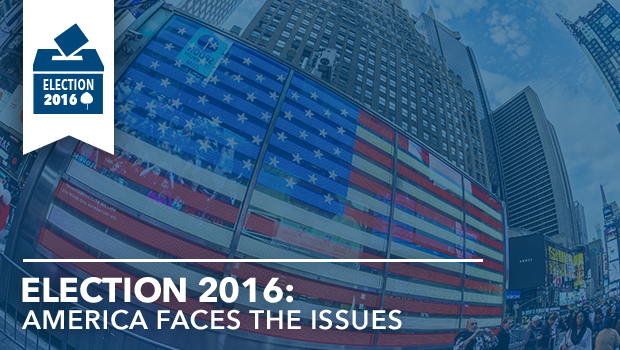The election is nearly over. Halloween, made even more terrifying this year by the seemingly endless countdown to the fractious election, is past. Now the calendar turns to Thanksgiving, grounded in our collective national consciousness on a celebration of unity between often-warring parties. Badly divided as we find ourselves today, how can we come together again to solve our problems rather than blame the other side for all of them?
When I was a child, the family friend who babysat me while my parents worked would put an end to my most annoying antics with the command: “Now sit yourself down because it’s time for us to have a real serious conversation.” Our long national temper tantrum has (perhaps) finally concluded, but we still need to sit ourselves down because the time has come for a “real serious conversation.”
Noise and sensationalism of the presidential campaign have drowned out urgent issues.[/quote_embed]
The noise and sensationalism of the presidential campaign’s made-for-Twitter-and-television drama have drowned out urgent issues that need immediate bipartisan attention. One is vast economic inequality, exacerbated by our naïve, simplistic understanding of the long-term implications of an ever-widening gap between those who have much and those who have almost nothing. Will people like me, who grew up in relative or absolute poverty, be unable to afford a college education like the one I received? Will those who choose not to go to college be able to achieve the American Dream?
At a more fundamental level, we no longer seem to understand each other, much less our system of government. A good grasp of the separation of powers doctrine creates awareness that it is not a good thing to have two increasingly feeble political parties, one self-destructing and the other barely hanging on. When you understand this, you do not want one of the parties to “crash and burn.” Rather, you long for a strong two-party system characterized by healthy, non-destructive tensions.
This inability to appreciate and value other points of view infects not only politics but American higher education as well. It is easy to criticize Donald Trump as unenlightened and prone to dehumanize his rivals, but it’s harder to recognize that the putatively liberal American university campus bears much responsibility for harboring intolerance and narrow-mindedness. Academic freedom, which prepares students for the outside world by requiring them to think critically, has been largely snuffed out by a form of intellectual piety that not only dismisses opposing points of view, but even refuses to listen to them. It has become fashionable at elite universities to disinvite speakers whose beliefs do not carry the day on their campuses. What began as a free speech movement at Berkeley in 1964 has seriously deteriorated.
[quote_embed]People cannot be reduced to a single story. We are too interesting and complex.[/quote_embed]
In short, both Left and Right have been guilty of reducing people who are unlike them to stereotypes based on party affiliation, gender, race, class, sexual orientation, and economic status. The truth is that people cannot be reduced to a single story. We are too interesting and complex.
We have never been a “perfect” union, as Jefferson first noted and Lincoln and King reminded us, but in our best moments we doggedly pursue the highest ideals of our democracy. But precisely because we live in a democracy, it takes all of us doing our part. At the Aspen Institute, from our founding, we have sought to create a safe place for all ideas to be debated and discussed in a non-partisan way, with a goal of finding viable solutions to the most pressing issues confronting society. We seek to move the conversation forward, by bringing it to the American people.
[quote_embed]We still believe in the power of bringing people together.
Our commitment is not only to convene people from different backgrounds and political persuasions, but to expand beyond the traditional mediums of communication and incorporate more varied outlets, such as Twitter, Facebook and other social media platforms, in order to further broaden the body of participants in these age-defining discourses. Despite a focus on leveraging technology, we still believe in the power of bringing people together, and are committed to promoting more town hall convenings. We endeavor to go across the country, in communities and on campuses, curating conversations about intergenerational poverty, job creation and workforce preparedness, economic advancement, educational opportunity, citizenship, and race, culture, and identity.
As I reflect on these turbulent times I am reassured by what I have seen when taking Aspen dialogues across America over the last three years. From Arkansas to Georgia, Austin to Omaha, Charlottesville to Silicon Valley, I have seen that there is more that unites us than divides us. That deep to the core of our American DNA, regardless of where we come from or what our backgrounds are, we all desire hope for our children, want the opportunity to fulfill our dreams and ambitions, and possess a deep and abiding love of country.
I have good reason not to lose hope and good reason to believe that the future is every bit as auspicious as the past. The challenges facing our great society mandate that we stop acting the way that we have been and demand that we conduct a strong national conversation in which we listen as well as speak. That is the place to begin, just as my babysitter prescribed all those years ago.


